

Postmodern literature. Pynchon-L. Welcome aboard, gee, it's a fabulous or-gy That you just dropped in on, my friend-- We can't recall just how it start-ted, But there's only one way it can end!

The behaviour is bestial, hardly Marie-Celestial, But you'll fit right in with the crowd, If you jettison all of those prob-lems, And keep it hysterically loud! Info file from Pynchon-L: Feel free to join either Pynchon-l or Pynchon-l-digest by using this form. You can manually join the list by sending a message to waste@waste.org with the line "subscribe pynchon-l" in the body. To leave the list, send "unsubscribe pynchon-l" instead. As far as we're concerned, pretty much any Pynchon-related topic is OK on this list, from Pynchon apocrypha through light discussion of our favourite passages, to litcrit as heavy as you want. If you are not hearing enough from the list, start a discussion. Please remember to distinguish between replies to individuals and replies to the group. To search the archives, enter keywords below: Enjoy. Simulacrum. A simulacrum (plural: simulacra from Latin: simulacrum, which means "likeness, similarity"), is a representation or imitation of a person or thing.[1] The word was first recorded in the English language in the late 16th century, used to describe a representation, such as a statue or a painting, especially of a god.
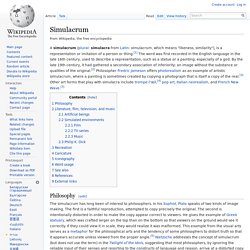
By the late 19th century, it had gathered a secondary association of inferiority: an image without the substance or qualities of the original.[2] Philosopher Fredric Jameson offers photorealism as an example of artistic simulacrum, where a painting is sometimes created by copying a photograph that is itself a copy of the real.[3] Other art forms that play with simulacra include trompe-l'œil,[4] pop art, Italian neorealism, and French New Wave.[3] Philosophy[edit] Post-structuralism. Post-structuralism is a label formulated by American academics to denote the heterogeneous works of a series of mid-20th-century French and continental philosophers and critical theorists who came to international prominence in the 1960s and '70s.[1][2][3] A major theme of post-structuralism is instability in the human sciences, due to the complexity of humans themselves and the impossibility of fully escaping structures in order that we might study them.
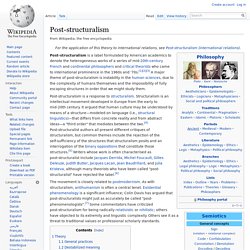
Post-structuralism is a response to structuralism. Structuralism is an intellectual movement developed in Europe from the early to mid-20th century. Theory[edit] General practices[edit] The author's intended meaning is secondary to the meaning that the reader perceives. Intertextuality. Intertextuality is the shaping of a text's meaning by another text.
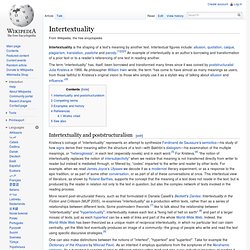
Network theory. A small example network with eight vertices and ten edges.
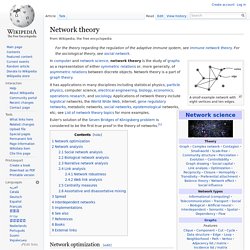
The Effects and Dynamics of Networks, Texting, and Power Relatio. J.D.
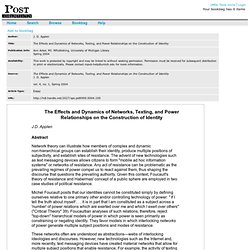
Applen Abstract Network theory can illustrate how members of complex and dynamic non-hierarchical groups can establish their identity, produce multiple positions of subjectivity, and establish sites of resistance. The advent of new technologies such as text messaging devices allows citizens to form "mobile ad hoc information systems" or networks of resistance. Any act of resistance can be problematic as the prevailing regimes of power compel us to react against them, thus shaping the discourse that questions the prevailing authority. Michel Foucault posits that our identities cannot be constituted simply by defining ourselves relative to one primary other and/or controlling technology of power: " If I tell the truth about myself . . . it is in part that I am constituted as a subject across a 'number' of power relations which are exerted over me and which I exert over others" ("Critical Theory" 39).
Networks Political Networks—People Power II. 10 Amazing Visualizations of Social Networks. TED: Ideas worth spreading. Metanarrative. A metanarrative in critical theory and particularly in postmodernism is a narrative about narratives of historical meaning, experience or knowledge, which offers a society legitimation through the anticipated completion of a (as yet unrealised) master idea.[1][2][3] The term was brought into prominence by Jean-François Lyotard in 1984, with his claim that the postmodern was characterised precisely by a mistrust of the grand narratives (Progress, Enlightenment emancipation, Marxism) that had formed an essential part of modernity.[4] [edit] Simplifying to the extreme, I define postmodern as incredulity toward metanarratives[. ..]
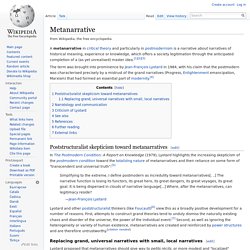
The narrative function is losing its functors, its great hero, its great dangers, its great voyages, its great goal. It is being dispersed in clouds of narrative language[...] Lyotard and other poststructuralist thinkers (like Foucault)[6] view this as a broadly positive development for a number of reasons. Narratology and communication[edit] See also[edit]